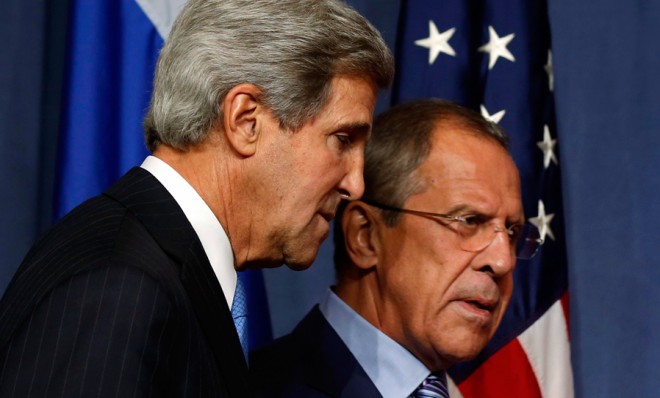How Obama's threat of force could derail the Syrian chemical weapons deal
Russia says military action is not part of the agreement


A free daily email with the biggest news stories of the day – and the best features from TheWeek.com
You are now subscribed
Your newsletter sign-up was successful
The Russian-U.S. deal on destroying Syria's stockpile of chemical weapons allowed President Obama to pause his push for military strikes to punish Bashar al-Assad's regime for allegedly gassing its own citizens.
It will take a United Nations Security Council resolution, though, to spell out precisely how to accomplish that ambitious task — no cakewalk in a country still locked in a civil war. And diplomats say the U.N. negotiations have stalled over the crucial question of whether the Security Council will authorize the use of military force against Syria if it fails to live up to its end of the bargain.
Obama and Secretary of State John Kerry have stated flatly that the U.S. reserves the right to attack Assad's regime if he doesn't follow through on his promise. "Should diplomacy fail," Kerry says, "the military option is still on the table."
The Week
Escape your echo chamber. Get the facts behind the news, plus analysis from multiple perspectives.

Sign up for The Week's Free Newsletters
From our morning news briefing to a weekly Good News Newsletter, get the best of The Week delivered directly to your inbox.
From our morning news briefing to a weekly Good News Newsletter, get the best of The Week delivered directly to your inbox.
The trouble is that Kerry's Russian counterpart, Sergey Lavrov, is warning that his country, which holds veto power on the Security Council, will not support any resolution that includes the threat of force.
That is potentially a huge problem. "Absent the threat of force, it's unclear to me how Syrian compliance will be possible under the terms of any agreement," Sen. Bob Corker (R-Tenn.), the top Republican on the Senate Foreign Relations Committee, tells NBC News.
The American public appears eager to see the U.S. and Russia reach an agreement. Polls indicate that Americans overwhelmingly support finding a diplomatic solution to ridding Syria of its estimated 1,000 tons of sarin nerve agent, mustard gas, and other chemical weapons. In a new Washington Post–ABC News survey, 79 percent said they supported the Russian-U.S. deal, although 68 percent said they had little faith that Syria would follow through.
The U.N. on Monday confirmed that sarin gas was used to kill hundreds of people behind rebel lines outside Damascus on August 21, bolstering the case to give the resolution teeth. And Secretary-General Ban Ki-moon, who has called the attack a clear war crime, says any deal the Security Council passes must be enforceable.
A free daily email with the biggest news stories of the day – and the best features from TheWeek.com
Ban said the best way to do that would be to invoke Chapter 7 of the U.N.'s charter, which allows for enforcement of the organization's decisions through several means, including military action and economic sanctions.
There's certainly a chance that Russia would block a vote if it contains wording it sees as too forceful. Russia and China have already used their Security Council vetoes three times to protect Assad.
But at this point, Russia stands the most to lose if a deal falls through. "[Russian President Vladimir] Putin is now seen as a dominant and potentially positive force on the international stage," says Aaron David Miller at Foreign Policy. "If the framework succeeds, he will have shown that the road to a solution can lie through Moscow."
And if it doesn't succeed, Russia could quickly morph from a peacemaker into a cynical wheeler-dealer that bought Assad a precious reprieve. That, in turn, would strengthen the U.S.'s hand to act without Security Council approval.
Harold Maass is a contributing editor at The Week. He has been writing for The Week since the 2001 debut of the U.S. print edition and served as editor of TheWeek.com when it launched in 2008. Harold started his career as a newspaper reporter in South Florida and Haiti. He has previously worked for a variety of news outlets, including The Miami Herald, ABC News and Fox News, and for several years wrote a daily roundup of financial news for The Week and Yahoo Finance.
